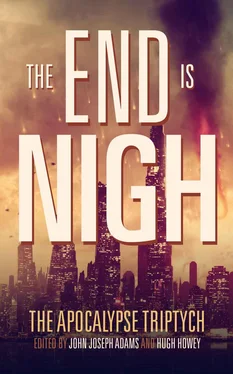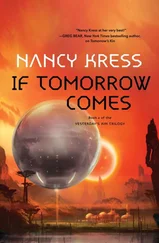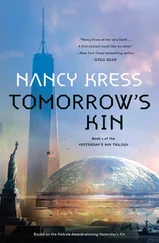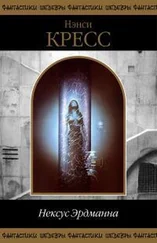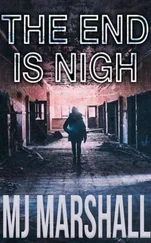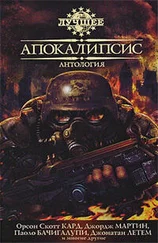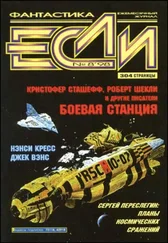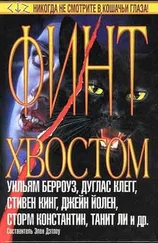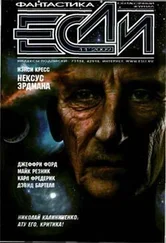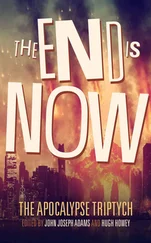“Do you have any family nearby?” he called.
She pulled out her phone, hit a key and held it to her ear.
Johnny so wanted whatever aunt or grandparent she was calling to answer, but she just went on standing with the phone to her ear, her face streaked with tears, her long brown hair frizzy and tangled.
Finally, she let her hand drop. “No answer.”
“Fill up your bathtub,” someone called.
Johnny turned. Mrs. Mackery from next door was on her lawn in a bathrobe. It was a man’s bathrobe, probably her late husband’s.
“The radio said the power’s bound to go out, so to fill your bathtub,” Mrs. Mackery repeated.
Headlights appeared down the street, accompanied by a rumbling. An open-bed military truck came around the corner, soldiers in yellow hazmat suits riding in the back. Kelly ran to the edge of her lawn, waving frantically, both hands over her head, screaming at the top of her lungs for them to stop.
They blew right past. They barely looked at her.
Behind him, Johnny’s screen door squealed open. He turned to find his dad, dressed in jeans and one of his old blue Goodyear work shirts, heading down the sidewalk carrying a brown bagged lunch. “I told you once already,” he muttered. “I’m not gonna argue about it.”
“Dad. Hang on.” He jogged up the lawn, got his father turned around and led him back inside.
A few doors down a minivan was backing out of the Rosso’s driveway.
“Look,” Johnny called to Kelly and Mrs. Mackerey from his door, “I’m here if there’s anything I can do to help.” He looked at Kelly. “I’m sorry, though, I’m not going back in that house. I don’t think you should, either.”
Johnny closed and locked the door.
He passed Dad, who was peering out the back door, into the yard, his bottom lip working soundlessly. He’d stare out at the aluminum shed and the discarded tires for an hour if Johnny let him.
As if the solution to all his problems, the answer to the secrets of the universe, could be found in there, if only he looked hard enough.
Sometimes Johnny was sure his dad was looking into the overgrown weeds beyond the shed, trying to locate the stone that marked Buster’s grave. When Buster no longer had the strength to stagger out into the yard to relieve himself, when he just lay curled up on the carpet whining, they’d taken him to the vet and had him put down.
• • • •
By sunup there were twice as many dots on the CNN map. No one was allowed out of the infected areas.
“I’m sick of the news,” Dad said, still in his Goodyear work clothes, the pants on backwards. Johnny wondered if he was going to have to start dressing his father. The thought made him a little sick.
“Put on something good,” Dad persisted. “I want to watch The Rockford Files .”
Jesus, Johnny had only the vaguest memory of The Rockford Files . He must have been five when it went off the air. He turned off the TV. “Come on Dad, we have to go to the grocery store.” They needed more food; there was almost nothing in the house.
As soon as he hit the driveway, Kelly Cramer was out of her house, running toward them. “Can I come with you?”
Johnny motioned toward the Cramer’s driveway. “You have a car.” It came out harsher than he’d intended.
“I’m scared.”
Scared of what , he wanted to ask. This was Ravine, not Philadelphia. There weren’t going to be looters and gangs running wild among the six or seven stores that made up what passed for a downtown.
Kelly stopped a few paces short of them, folded her arms. “If you were going to get it, you’d probably have it already. It takes seven days for the symptoms to show up, so all the people getting sick now were exposed a week ago.”
Johnny pictured the drive-in’s few customers handing him money. Christ, Arnie Marino was a mail-sorter; if he’d gotten it, he’d spread it to all the mail.
Kelly was waiting, her eyes pleading with him.
Christ, when had he become such a dick? He’d known Kelly since she was a baby, and he was, what, sixteen? He’d seen her at a hundred neighborhood barbecues, almost hit her backing out of his driveway about twenty times. They’d never been anything like friends, probably because of the age difference. She’d been kind of a rebel back in high school—shaved head, shredded jeans, cigarettes. There was no sign of that side of her now—she was wearing cut-off denim shorts over purple leggings, her hair in a ponytail.
He put a hand on her shoulder. “Come on, get in.”
• • • •
Johnny cruised past Burger King just to make absolutely sure it was closed. He was scheduled to work the eleven to seven shift, but it was completely dark inside, as he’d suspected. He drove on down Route 60, which doubled as Main Street in Ravine. There was no mystery about how the town had gotten its name: it was set in a long, thin sliver of flat land, hugged on both sides by steep hills. If you were in Ravine, you could see both hills pretty much wherever you were.
People on the streets were hurrying along, heads down, many clutching handkerchiefs or hand towels to their faces.
“How are your folks?” Johnny asked. He knew how they were, but he didn’t want Kelly to think he didn’t care. He glanced over at her: she was fighting back tears.
“They’re good people,” Johnny said. “Your dad used to take me along to Penguins games up in Wilkes-Barre when I was in high school. You remember that?”
“If you were in high school, I was like, minus two years old.” She wiped under her eyes with her knuckle.
“Oh, right. Duh.” Sometimes he forgot he was almost forty-two years old. It just didn’t seem possible.
He spotted the military vehicle that had passed them, parked in the parking lot of the firehouse, beside a big silver delivery truck.
Johnny pulled in. “Here we go. We can find out what’s going on.”
People in hazmat suits were carrying sacks and boxes to idling cars. Johnny watched as a hazmatted soldier dropped a sack and a small box in the back of an F-150 pickup. The truck took off.
Johnny popped his trunk, waited for someone to carry supplies over. He rolled down his window. “How long is the quarantine gonna last?”
The soldier came around to the window. He was a young guy, Asian. “Two weeks, at least.”
Johnny jerked his thumb toward Kelly. “Her folks are sick. What is she supposed to do?”
“Feed them and keep them hydrated.”
“And what if she gets sick, and I get sick? Who keeps us fed and hydrated?”
The solider looked left and right, like he was looking for help. “Look, I’m just handing out supplies. I don’t have the answers. Listen to the radio.”
How could they do it, Johnny wondered? Go house to house, carry out the infected and take them…where? To big tents? CNN said twenty-eight thousand people had gotten sick in Wilkes-Barre in two days. Those tents would need to be awfully big.
“There aren’t enough hazmat suits, are there?” he asked the soldier. “Not enough doctors and nurses.”
Johnny could barely hear the soldier’s words through the faceplate: “There’s nothing doctors can do for them.”
• • • •
Johnny spotted movement out the picture window: Kelly, wearing one of the white surgical masks from the survival kit they’d been given. He watched as she went three doors down, to the Baer’s house, and knocked. When no one answered, she let herself in.
Ten minutes later she came out and went to the next house down. The Pointers lived there: old lady Pointer, always digging in her flower garden out front; her son Archie, who worked at the body shop; and Archie’s kids, Mackenzie and Parker.
Читать дальше
